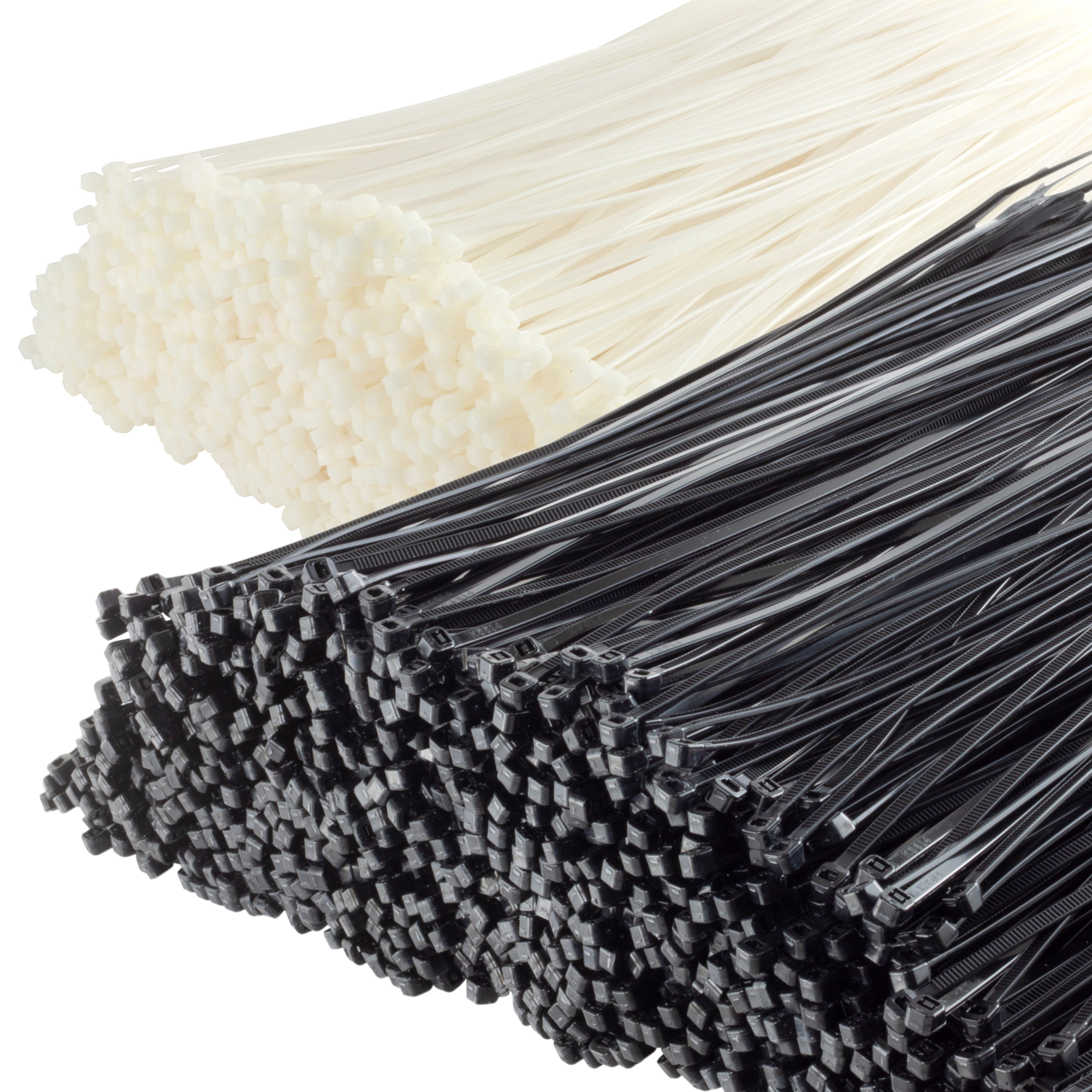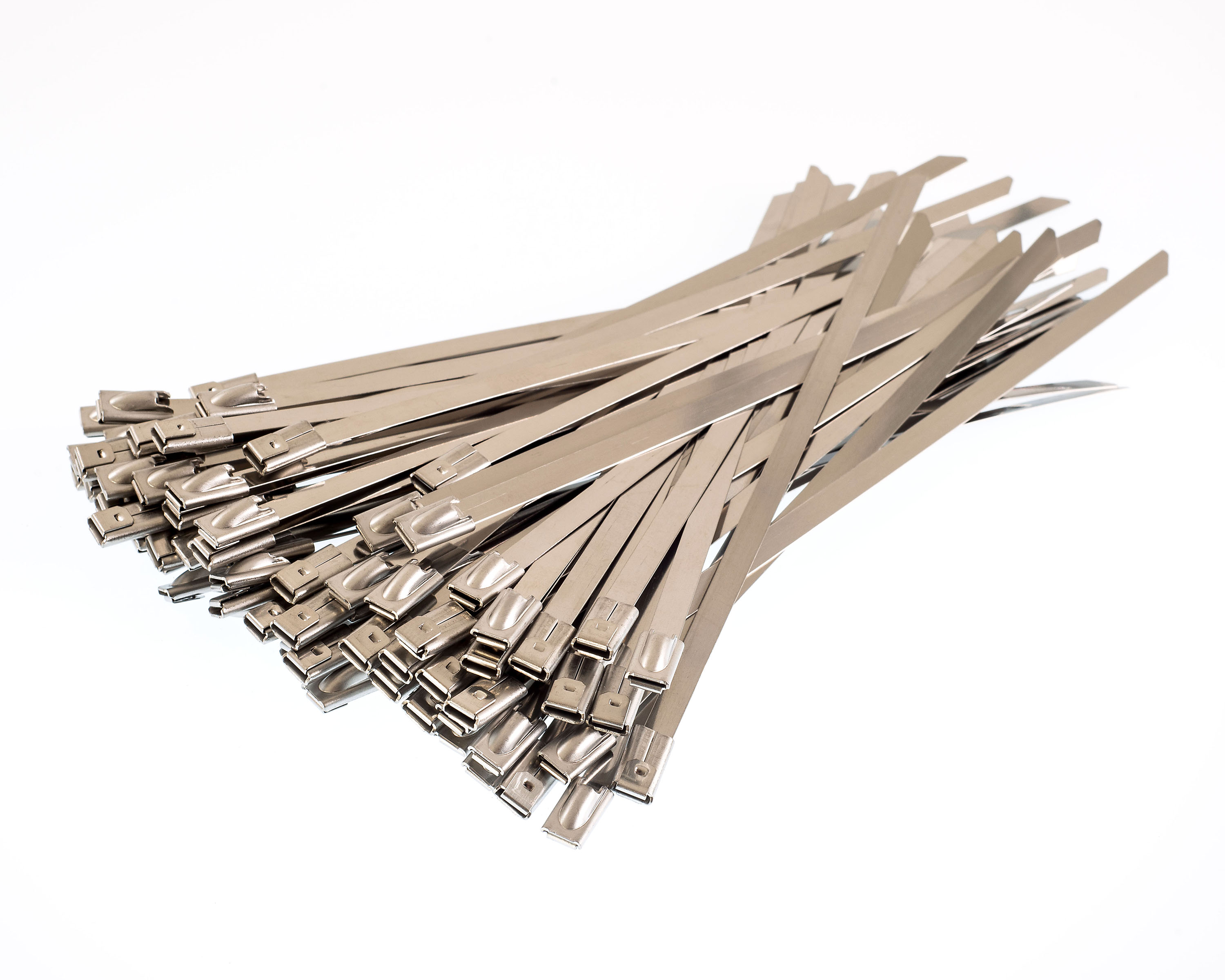Cable ties are predominantly made from plastic, metal or a combination of metal coated in plastic.
Each cable tie is designed to be used in specific environments, with different structural properties making each tie suitable for different conditions.
The right material cable tie will depend on the environment in which you plan to use them.
We’ll take a look at each material in more detail, and untangle the differences between each, followed by an overview chart covering each material, their main features and the environment in which they are designed to be used within.
Standard Nylon Plastic Cable Ties

What type of plastic are cable ties made from?
The standard cable tie is made from nylon 6/6 and is suitable for most general-purpose applications.
Nylon 6/6 refers to the nylon’s chemical structure, and more specifically, the number of polymer chains that make up that structure.
Nylon 6/6 is ideal for general purpose cable ties due to it’s flexibility, high tensile strength, resistance to tension, and resistance to external agents and weathering.Nylon is a general name used to group together a number of different plastics, or synthetic polymers, referred to as polyamides.
UV and Heat Stabilised Nylon Cable Ties
Which cable ties are heat resistant?
Standard nylon cable ties are resistant up to +85°C. However, a general purpose nylon cable tie will see a reduction in it’s physical properties when exposed to extreme high temperature.
UV and heat stabilised nylon cable ties, on the other hand, are manufactured with specially formulated heat stabilizers to provide additional endurance, suitable for working environments up to 120°C.
Our UV and heat resistant cable ties also provide higher resistance to ultraviolet (UV) light, allowing these cable ties to be used in continuous exposure to outdoor use, making them perfect for jobs that require extra protection again sunlight and high temperatures.
Stainless Steel Cable Ties
What are metal cable ties?
 Metal cable ties are made from stainless steel to provide extra strength and withstand high temperatures, vibration. Also, due to the high melting point, 316 stainless steel cable ties are generally accepted as fire-resistant and flame retardant.
Metal cable ties are made from stainless steel to provide extra strength and withstand high temperatures, vibration. Also, due to the high melting point, 316 stainless steel cable ties are generally accepted as fire-resistant and flame retardant.
All our metal cable ties are made from marine grade 316 stainless steel, as they provide the highest tensile strength and the best available protection against corrosion, allowing them to be used in the most extreme temperatures and harsh environmental conditions.
The formation of a protective chromium oxide outer layer on the metal protects the base metal from moisture, preventing the formation of iron oxide or rust. Whilst 316 stainless steel is not completely rust-proof, it is the most corrosion resistant of the stainless steels.
Nylon v Stainless Steel Metal Cable Ties
Stainless steel cable ties should be preferred to standard nylon cable ties in conditions of extreme heat or harsh environmental factors where extreme weather conditions, extreme temperatures, radiation and strength are important considerations.
In these situations, nylon cable ties would not provide the added strength and corrosion protection provided by stainless steel cable ties.
Overview of Materials:
Which to Use and When
|
Type |
Properties |
Applications |
|
Nylon 6/6 – Standard Cable Ties
|
|
The standard nylon cable tie is suitable for general cable management and object securing applications. Commonly used in DIY, gardening, signage as well as many other household and commercial tasks.
|
|
Nylon 6/6 – UV & Heat Stabilised
|
|
UV and heat resistant cable ties are ideal for environments with extended exposure to sunlight. Where standard nylon cable ties can degrade if they are exposed to high levels of heat or UV rays these cable ties are made to withstand these higher temperatures and hasher conditions. This means that UV & Heat resistant cable ties are ideal for situations where they are closer to machinery that might increase the surrounding temperatures.
|
|
Nylon 6/6 – Metal Detectable
|
|
Metal detectable cable ties are designed for the food, beverage & pharmaceutical processing industries. The internal metal based nature of these cable ties means that they are easy to detect when they are used in processing so nothing is left within the contents of the items being processed.
|
|
Stainless Steel – Marine Grade 316 Stainless Steel
|
|
Stainless steel metal cable ties are commonly used for applications that require a higher strength, higher temperature range and resistance to weathering, corrosion, fire or chemicals. These cable ties are used when the additional material and tensile strength is required, they are widely used across aircraft, production line facilities, mines, commercial kitchens, power plants, tunnels and oil and gas platforms.
|
|
Stainless Steel – PVC Coated
|
|
PVC coated stainless steel cable ties are frequently used as long-term solutions in harsher environments, due to their resistance to water, salt and chemicals. Thanks to their incredibly hardwearing nature the PVC coated stainless steel cable ties are used in aeronautical, mining, maritime and other heavy duty industrial applications.
|
|
Stainless Steel – Epoxy Coated
|
|
Epoxy coated cable ties are frequently used as long-term solutions in harsher environments due to their resistance to water, salt and chemicals. Similar to the PVC coated stainless steel ties these cable ties are used in incredibly heavy duty and demanding environments
|
We hope this guide helps differentiate the different types of materials available and provides some guidance on the best solution to use in which environment.
For any further questions on specifics, you can contact us via live chat, email or phone for further enquiries and we’d be happy to help.
Keep an eye out for our next article, which works to unpack the jargon surrounding cable ties to help understand the practical implications of the different sizes, bundle diameters and tensile strengths.
Enjoyed this article? Explore our latest buyer’s guide on automotive products.
- Battery & Welding Cable Buyer's Guide
- Explaining Multi-Core Cables
- How to Install Electrical Cables
- Specifications for Autmotice Cables Defined
- Types of Automotive Cables & Application

